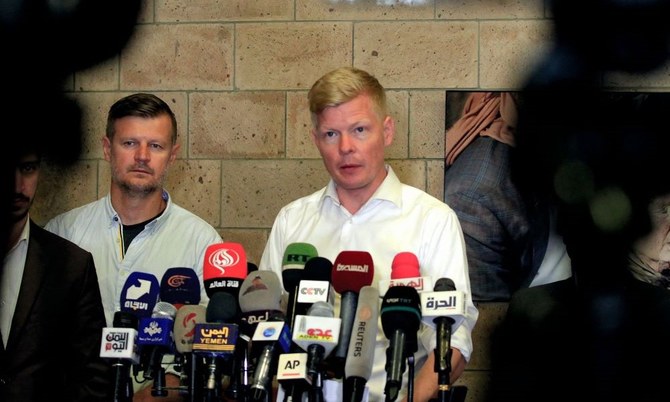AL-MUKALLA: The UN Yemen envoy said on Thursday that he had a productive meeting with Yemen’s leader of the Presidential Leadership Council in the country’s southern city of Aden, a day after expressing similar optimism following a meeting with Houthi leaders in Sanaa.
Hans Grundberg urged the Yemeni government and the Iran-backed Houthis to take advantage of the recent progress in peace efforts and the international support for ending the war in order to make concessions and begin negotiations, emphasizing that the Yemeni conflict can only be resolved through dialogue and political will.
“I have engaged in a fruitful, substantive discussion with President Al-Alimi on the way forward that addresses the immediate concerns of Yemenis and advances an inclusive Yemeni-led process under United Nations auspices,” Grundberg said, referring to PLC head Rashad Al-Alimi.
“I remain committed to supporting a durable resolution to the conflict that reflects the will of the Yemeni people,” he added.
The UN envoy arrived in Aden on Wednesday and left the same day.
The official news agency SABA reported that Al-Alimi expressed the council’s support for the envoy’s efforts to achieve peace in Yemen and welcomed any peace initiative to end the war in Yemen.
He called for the Houthis to comply with peace efforts, including the Saudi initiative, by releasing prisoners, ending human rights violations, and closing their annual summer camps used to indoctrinate and recruit Yemeni children.
“The head of the Presidential Leadership Council stated that the Houthi militia was not prepared for the peace option, regardless of the worsening suffering, as evidenced by the tragic stampede disaster in Sanaa that claimed the lives of dozens of impoverished people seeking humanitarian aid,” the Yemeni leader said, according to SABA.
Grundberg briefed reporters at Sanaa airport on Wednesday after concluding his two-day visit to the city, stating that he had constructive talks with the Houthis that could pave the way for moving forward with comprehensive peace talks.
He emphasized that the agreement between the Yemeni government and the Houthis should lead to the permanent cessation of hostilities, the lifting of restrictions on Sanaa airport and Hodeidah ports, and the lifting of the Houthis’ siege of Taiz.
“I am encouraged by the positive and constructive atmosphere during my meetings here in Sanaa. and I look forward to returning in the near future to continue our engagement,” the UN envoy said.
He added: “I have had positive engagements with the authorities in Sanaa. We had frank, detailed and constructive discussions on the way forward. And I am encouraged by what I’ve heard and indeed by the constructive engagement by all sides at this critical time.”
Yemen’s peace efforts gained a significant boost last month when the Saudi Ambassador to Yemen Mohammed Al-Jaber undertook a rare visit to Houthi-controlled Sanaa, bringing a semi-final text of the peace deal that tackles difficult points.
Paying public personnel in Houthi-controlled areas has been identified by Yemeni government officials as a point of contention between them and the Houthis.
The Houthis demanded that the Yemeni government transfer salaries to them so that they could distribute them to the employees, whereas the Yemeni government insisted on paying the salaries to the workers based on a payroll audited for 2014 without Houthi interference.
At the same time, the Yemeni government and the Houthis announced that they are prepared to begin the second round of prisoner exchange negotiations to free all detainees and those who have been forcibly disappeared.




























